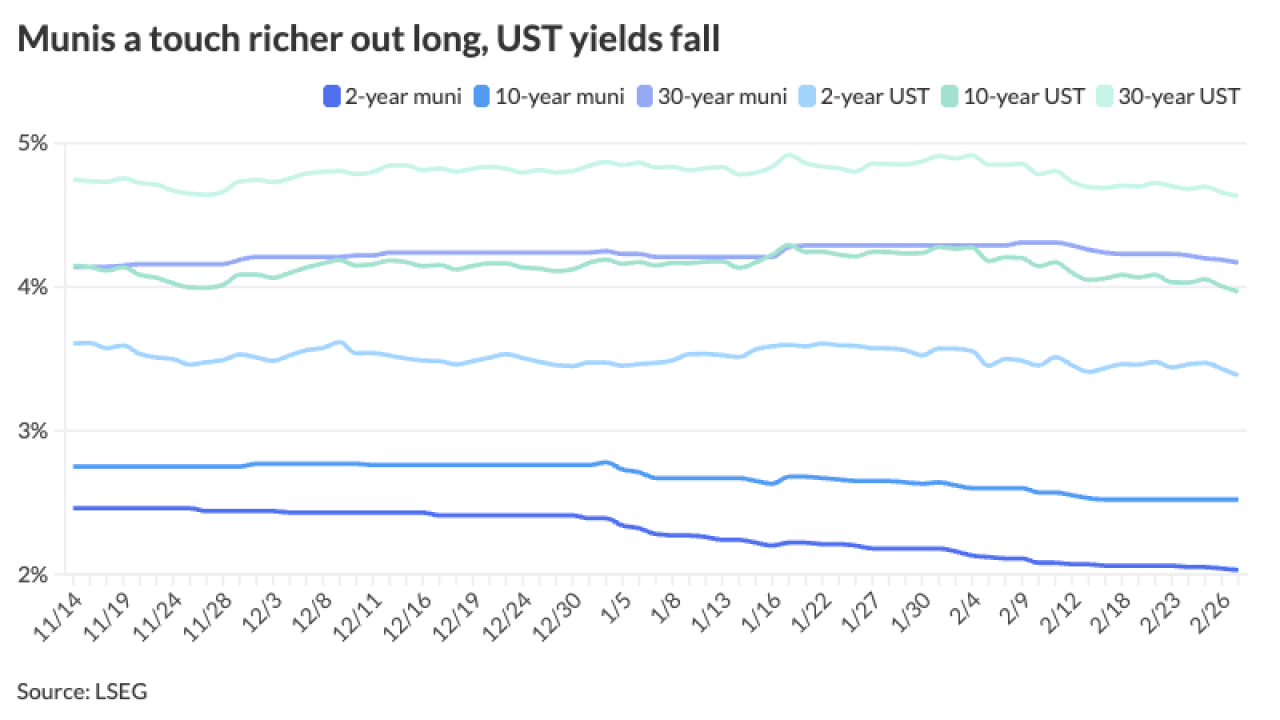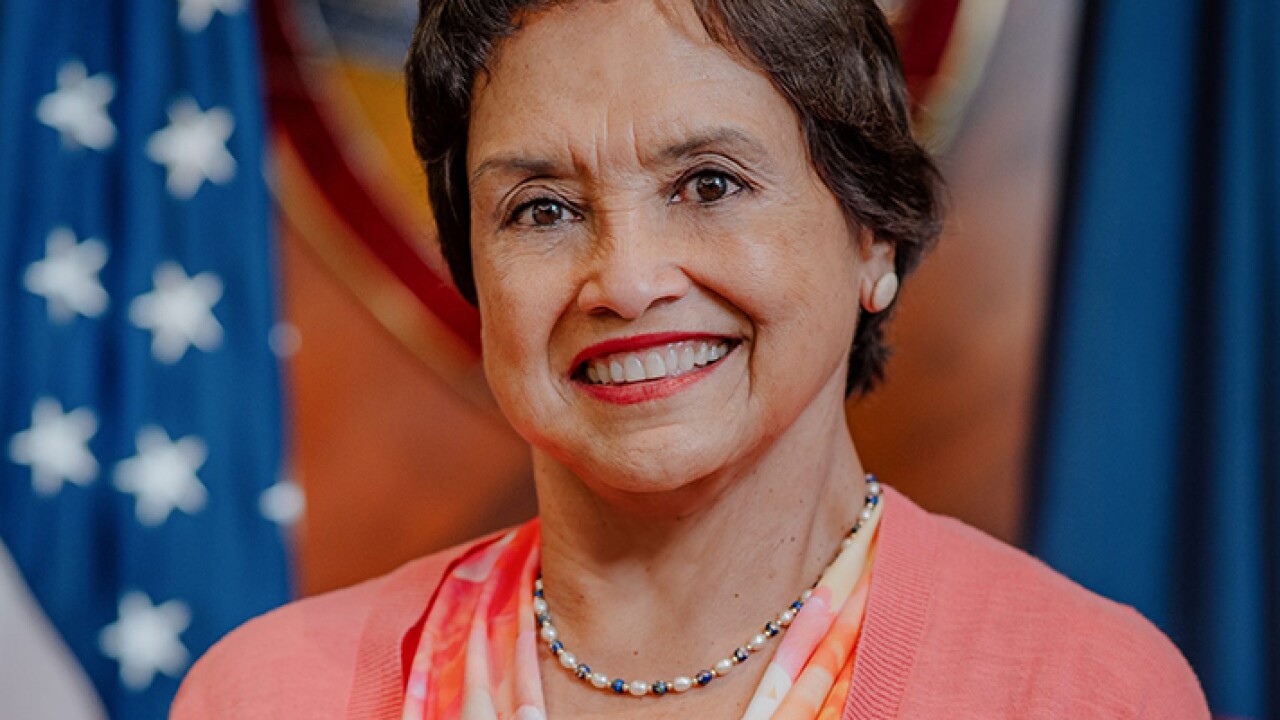After nearly four years of marketing and development -- and with the help of two seasoned, well-known muni bankers -- Primuni last month waded into uncertain and untested waters.
Processing Content
The Pittsburgh-based company pitches its services to issuers as a way to shave borrowing costs by locking up a certain amount of primary market supply for retail brokerages. While it remains to be seen whether Primuni will find profits in a market that has seen underwriting spreads hover at less than $6 per $1,000 of debt. The company has worked its first deal and hopes to land more business soon.
Primuni waived its fee and put its system and methodology to the test on the Pittsburgh Public Parking Authority's $54 million revenue deal Jan. 27.
Executive director Ralph Horgan estimated the authority saved roughly $19,000 by using Primuni.
"We had immediate access to [a broader] market on the first day," Horgan said.
Approved as a broker-dealer by the National Association of Securities Dealers and the Securities and Exchange Commission in July 2002, Primuni gives "priority" orders to retail brokers for new bond issues.
By earmarking these priority orders at a higher price for retail brokers, who are then assured of their orders, issuers can receive a greater portion of the spread usually taken in the form of sales commissions by large institutional buyers and speculators in the secondary market, according to Primuni president Roger Hayes.
For the Pittsburgh parking authority deal, priority orders handled by Primuni were marked up with a three basis point "differential" along the entire yield curve of maturities sold, Hayes said.
So far, regulators have given little comment -- declining to approve or disapprove of Primuni.
Martha Haines, chief of the SEC's Office of Municipal Securities, called it an "interesting new concept."
Municipal Securities Rulemaking Board executive director Christopher Taylor said the MSRB acknowledges "constant innovation in the market." The board provided an interpretive letter in response to Primuni's questions in 2001, which is posted on the company's Web site, and indicates that Primuni does not run afoul of MSRB Rule G-30 on pricing, G-32 on new-issue disclosure, and G-21 on advertising.
Hayes, a former MSRB chairman and investment banker for 28 years at Banc of America Securities, said his years in the market convinced him that the "most daunting" challenge he faced as a banker was getting broad distribution in the primary market. He said he believes Primuni can change that.
"It's very difficult, given the small spreads that are available in the municipal bond market," Hayes said.
Primuni received about $9 million of priority orders from two subscribing brokers on the Pittsburgh authority deal, sold as Series A. Hayes declined to disclose the brokers' names.
The Public Parking Authority's sole underwriter on the deal, Mellon Financial Markets, which initially priced the bonds and had "no economic incentive to use Primuni," agreed to accept these priority orders into their syndicate, Hayes said. Officials at Mellon declined to comment on the deal or Primuni.
Mellon marketed the $45 million balance of Series B debt on its own. Primuni, however, was able to avoid underwriting risk on the deal because it acted only as an agent for retail brokers and submitted their orders to Mellon, Hayes said.
In all, about 18% of the Pittsburgh authority's deal was sold to retail brokers via Primuni. That compares with the "typical 10% to 15%," Horgan said.
Using Primuni alone was not an option, according to Horgan. "We still needed the large institutional distribution from Mellon. $54 million in bonds is a lot to digest in one day," he said.
Series A bonds were priced to yield from 2.27% in 2006 to 4.53% in 2026, while Series B bonds were priced to yield from 3.30% in 2012, to 4.56% in 2026. The bonds were insured by Financial Guaranty Insurance Co., and rated triple-A by Moody's Investors Service and Standard & Poor's.
The 2019 maturity in Series A priced to yield 4.17% on Jan. 27, Series B was priced to yield 4.20% for the same maturity, compared to the 3.96% yield on the triple-A insured yield curve scale compiled by Municipal Market Data for a 2019 maturity that day. The MMA's consensus yield curve for a national, uninsured triple-A bond with a 2019 maturity showed a median 3.97% yield that day.
Meanwhile, Primuni has contracts with about 25 broker dealer subscribers, and in the future, will charge them between $500 to $2,500 per month, depending on their size to have access to bonds during the retail period, Hayes said. Issuers may also be charged based on a to be determined percentage of priority orders received. Primuni does not receive any of the underwriter's takedown.
Issuer officials, including Cook County, Ill., chief financial officer Tom Glaser and Wisconsin capital finance director Frank Hoadley, said they may consider using Primuni, especially if the system proves to result in better prices for their bond sales.
"It's the right concept," Glaser said.
"The devil's in the details in how you implement it," Hoadley said. "The muni market has never been real efficient at getting bonds into investors' hands."
Observers say the muni bond market has long been segregated by two prices, wholesale for institutional investors -- who are usually able to obtain more favorable prices than retail investors in both the primary and secondary markets because they buy in larger blocks -- and retail for smaller individual investors.
Additionally, distribution is mostly "a secondary market system, not a primary market system, and the issuer is not getting the benefit of it," Hoadley said.
The Pittsburgh authority's bonds maturing in 2013 through 2018 in Series A and B eventually saw markups in the secondary market ranging from 13 to 54 basis points, according to MSRB data.
A study conducted last year showed muni spreads in the secondary market averaged 200 basis points for retail sized trades and 100 basis points for institutional sized trades of about $200,000. The study was carried out by Lawrence Harris, former chief economist at the SEC and professor at the Marshall School of Business at the University of Southern California, and Michael Piwowar, an economist in the SEC's Office of Economic Analysis,
"That's the hard part in this whole affair. We don't know how expensive it is to move the bonds from large blocks held by underwriters to small chunks that will end up in the portfolios of retail investors," said Carnegie Mellon University business professor Richard Green, who previously authored a study on spreads in the muni market with data provided by Primuni founder Tal Heppenstall.
"How much of those markups are compensation for those costs? How much of it is due to intermediaries trading in an opaque market where it's hard for people to shop effectively?" Green asked.
"[Primuni] is challenging some very old habits in the municipal markets, and it's hard to change those. You're challenging the underwriters for full disclosure of who's buying the bonds and at what cost. You have a price differential, and you're sharing that with issuers," Glaser said.
Traditionally, markups have gone to the underwriting side in the form of commissions in exchange for the capital they put at risk buying the bonds.
"The fact that issuers could, and should believe, they could participate in those savings, that's a hard concept for people to understand," Glaser said.
The fragmented municipal market, made up of 1.5 million different individual securities, where nearly half is held by retail investors, is "remarkably difficult to innovate in," Carnegie Mellon's Green said.
"Any time you introduce change, there's some degree of resistance," said Daniel Veres, chief operating officer at the Grant Street Group, which has run the MuniAuction competitive bidding Web site since 1997. The company claims its service lowers interest costs by increasing competition among underwriters.





